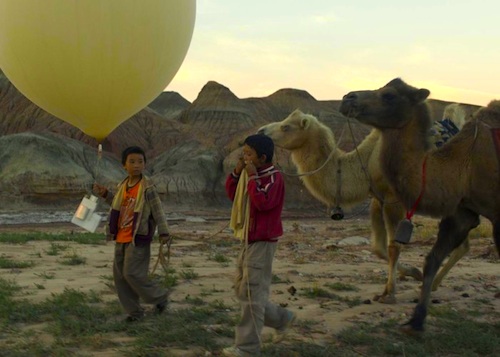By Joe Bendel. It is hard to believe, but the current administration actually believes the Chinese government is on board with their climate change protocols. Of course, these are the same people who believe the Iranian regime is a partner for peace. One look at the environmental degradation of China’s provinces and Tibet ought to curb everyone’s enthusiasm. Sadly, it is particularly apparent in northwest Gansu, the traditional home to Yugur (“Old Uyghur”) herders. Viewers will see how dry and desiccated the once fertile grassland has become in Li Ruijin’s River Road, which screens as part of the 2015 New York Asian Film Festival.
Their language is Turkic or Mongolic-based and their religion is Tibetan Buddhism. Their way of life is rapidly vanishing, but Adikeer and Bartel’s grandfather provides a link to the older, better days. Bartel, the older brother, lives with the old man, while his younger brother boards at their primary school. Their father promises to return for them at the end of the school term, as usual. However, each year he arrives later and later, because he has ventured further afield in search of grazable land for his herd. Unfortunately, after their ailing grandfather passes away, the boys find themselves waiting in vain for their father. With no other options, the lads set out, making their way home on camelback.
Essentially, Gansu has become desert, desert, desert everywhere, with not a blade of grass to graze. There is not a lot water, either. It will be a harsh journey, but the older, entitled Bartel petulantly wastes much of his own in the early stages. In contrast, Adikeer was born to be his father’s son, instinctively understanding the desert’s challenges. However, he begrudges the hand-me-downs and perceived second class treatment he receives from their family.
 There are some stunning shots of the boys walking through apparently abandoned cliff dwellings, cave paintings, and temples, almost resembling space travelers on an extinct alien planet. This is clearly a dire and deadly world. There are also very real stakes involved in their fraternal conflict. We come to understand in believably compelling terms how their resentments are rooted in misperceptions of necessities dictated by the family’s circumstances. Naturally, an arduous camel trek will only further fray their relationship.
There are some stunning shots of the boys walking through apparently abandoned cliff dwellings, cave paintings, and temples, almost resembling space travelers on an extinct alien planet. This is clearly a dire and deadly world. There are also very real stakes involved in their fraternal conflict. We come to understand in believably compelling terms how their resentments are rooted in misperceptions of necessities dictated by the family’s circumstances. Naturally, an arduous camel trek will only further fray their relationship.
Despite the intimacy of the story, Li still incorporates an awareness of the region’s once grand history, which only deepens the sense of tragedy. He and cinematographer Liu Yonghong convey a tactile sense of the region—it’s hot and dry. Yet, amidst the wasteland, a small contingent of Buddhist lamas represent hope (and sacrifice). As the film’s lynchpins, the co-leads, Tang Long and Guo Songtao are remarkably natural and unaffected, truly looking like rugged brothers.
River Road is a vividly naturalistic depiction of environmental devastation and the extreme privation of the economically marginalized. Ironically, this means it is highly unlikely most movie-goers in the People’s Republic will have much chance to see it. The sympathetic portrayal of the lamas does not help much either. For those in less restrictively censored markets, it is an exhausting but rewarding viewing experience. Recommended for those who appreciate independent Chinese cinema and endangered cultures, River Road screens this Friday (7/3) at the Walter Reade, as part of this year’s NYAFF.
LFM GRADE: A-
Posted on July 3rd, 2015 at 12:30am.